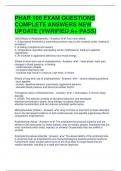PHAR 100 EXAM QUESTIONS
COMPLETE ANSWERS NEW
UPDATE (VWRIFIED A+ PASS)
CNS Effects of Amphetamines: - Answers -✔✔ Four main effects:
1. A decreased threshold for transmitting sensory input to the cerebral cortex, leading to
excitation1.
2. A feeling of euphoria and reward.
3. Temperature-regulation and feeding centre modifications, leading to appetite
suppression.
4. An increase in aggressive behaviour and mood swings.
Effects of short-term use of amphetamines - Answers -✔✔ - heart attack, heart pain,
changes in blood pressure, or fainting
- cardiovascular collapse
- increased respiratory rate
- overdose may result in a seizure, high fever, or stroke
Effects of long-term use of amphetamines - Answers -✔✔ - chronic sleeping problems
- poor appetite
- anxiety, repetitive behavior, psychoses, aggressive behavior
- elevated blood pressure and abnormal cardiac rhythm
Therapeutic Uses of Amphetamines: - Answers -✔✔ 1. Narcolepsy: A chronic sleep
disorder.
2. ADHD: This disorder consists of disruptive behaviour and decreased
attention/concentration spans. Drug therapy increases classroom
attention/concentration and can improve scholastic performance.
Methylphenidate (Ritalin) - Answers -✔✔ drug of choice to treat both of these disorders
due to the decreased incidence of both cardiovascular and appetite suppressing effects,
compared to amphetamine.
Amphetamine Abuse - Answers -✔✔ The amphetamines produce euphoria and are
effective CNS stimulants; for these reasons, they are widely abused. Amphetamines are
most commonly taken orally, injected, or smoked. Occasionally they are sniffed or
snorted.
Amphetamine abuse potential - Answers -✔✔ The abuse liability of the amphetamines
is extremely high as amphetamine and methamphetamine produce powerful euphoria.
Furthermore, water soluble saline forms of the drug allow for large doses that are
readily injectable, resulting in a rapid and intense response.
, The inherent harmfulness of the amphetamines is due to their long-term toxicities
(cardiovascular effects and drug-induced psychoses). However, this does not appear to
be a deterrent to abusers, and substantial health risks also occur due to a user's
lifestyle (i.e. contaminated needles and poor nutrition).
amphetamine dependence - Answers -✔✔ Cessation of use results in mood
depression that may be profound, prolonged sleep, huge appetite, lack of energy, and
fatigue.
amphetamine tolerance - Answers -✔✔ Tolerance develops to the euphoria and mood
elevating effects, the anorectic effects, the cardiovascular and respiratory stimulatory
effects, and the lethal effects of the drugs. However, tolerance does not develop to
therapeutic effects or drug-induced psychosis
amphetamine addiction - Answers -✔✔ Amphetamines are usually self-administered to
produce euphoria and an abrupt awakening sensation ("rush"). These effects act as
rewards and users will crave the drug's effects so intensely that if it is not available they
will experience panic.
Amphetamines - Answers -✔✔ Amphetamines are drugs of widespread abuse, and are
controlled substances in Canada, meaning their use is restricted to certain medical
conditions
The amphetamines include amphetamine, dextroamphetamine, and methamphetamine.
Two amphetamine-related compounds include methylphenidate (Ritalin), which is used
to treat attention deficit hyperactivity disorder, and MDMA (Ecstasy). MDMA is a drug of
abuse that is a derivative of methamphetamine. It fosters the feeling of intimacy and
empathy, while improving intellectual capacities. It is neurotoxic, causing neuronal
damage and death. This effect is long lasting, if not permanent.
Amphetamines Chemistry - Answers -✔✔ Amphetamines are synthetic organic
compounds. They are structurally similar to the endogenous neurotransmitters
norepinephrine and dopamine. They can be synthesized readily, and this has resulted in
the illicit manufacturing of these substances, especially methamphetamine. The purity of
these illicit substances is variable, and may contain side-products of the chemical
reaction, unreacted chemicals, and "cutting" agents (e.g. starch, baking soda).
Abuse of Cocaine - Answers -✔✔ Cocaine is widely abused, and often used
concurrently with other types of psychoactive drugs. It is usually sniffed or smoked, but
it can also be injected.
Effects of Long-Term Use of cocaine - Answers -✔✔ Toxic psychosis, including
paranoia.
Hallucinations or sensations of insects crawling under the skin.
Impaired sexual function.
Permanent brain damage and impairment of neuronal function may occur.
High blood pressure and an irregular heart rhythm.




